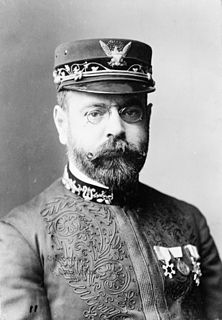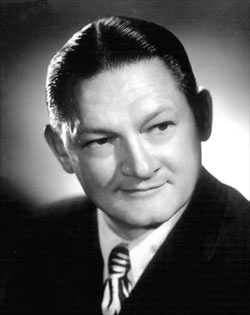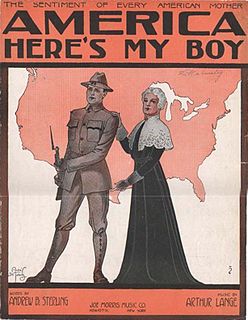Related Research Articles

John Philip Sousa was a Portuguese-American composer and conductor of the late Romantic era known primarily for American military marches. He is known as "The March King" or the "American March King", to distinguish him from his British counterpart Kenneth J. Alford. Among his best-known marches are "The Stars and Stripes Forever", "Semper Fidelis", "The Liberty Bell", "The Thunderer", and "The Washington Post".

The Original Dixieland Jass Band (ODJB) was a Dixieland jazz band that made the first jazz recordings in early 1917. Their "Livery Stable Blues" became the first jazz record ever issued. The group composed and recorded many jazz standards, the most famous being "Tiger Rag". In late 1917, the spelling of the band's name was changed to Original Dixieland Jazz Band.

Van and Schenck were popular American entertainers in the 1910s and 1920s: Gus Van, baritone, and Joe Schenck (pronounced "skenk"; born Joseph Thuma Schenck,, tenor. They were vaudeville stars and made appearances in the Ziegfeld Follies of 1918, 1919, 1920 and 1921. They made numerous phonograph records for the Emerson, Victor, and Columbia record companies.

Gustav Gerson Kahn was an American lyricist who contributed a number of songs to the Great American Songbook, including "Pretty Baby", "Ain't We Got Fun?", "Carolina in the Morning", "Toot, Toot, Tootsie ", "My Buddy" "I'll See You in My Dreams", "It Had to Be You", "Yes Sir, That's My Baby", "Love Me or Leave Me", "Makin' Whoopee", "My Baby Just Cares for Me", "I'm Through with Love", "Dream a Little Dream of Me" and "You Stepped Out of a Dream".

War bonds are debt securities issued by a government to finance military operations and other expenditure in times of war. They are also a means to control inflation by removing money from circulation in a stimulated wartime economy. War bonds are either retail bonds marketed directly to the public or wholesale bonds traded on a stock market. Exhortations to buy war bonds have often been accompanied by appeals to patriotism and conscience. Retail war bonds, like other retail bonds, tend to have a yield which is below that offered by the market and are often made available in a wide range of denominations to make them affordable for all citizens.

Albert Victor Young was an American composer, arranger, violinist and conductor.

A Liberty bond was a war bond that was sold in the United States to support the Allied cause in World War I. Subscribing to the bonds became a symbol of patriotic duty in the United States and introduced the idea of financial securities to many citizens for the first time.

"The Victors" is the fight song of the University of Michigan (UM) written and composed by UM student Louis Elbel in 1898. The song was first played publicly by John Philip Sousa and his band.

"National Emblem", also known as the National Emblem March, is a U.S. march composed in 1902 and published in 1906 by Edwin Eugene Bagley. It is a standard of the U.S. march repertoire, appearing in eleven published editions. The U.S. military uses the trio section as ceremonial music for the entry of the ceremony's official party.
Edgar Leslie was an American songwriter.

The "U.S. Field Artillery March" is a patriotic military march of the United States Army written in 1917 by John Philip Sousa after an earlier work by Edmund L. Gruber. The refrain is the "Caissons Go Rolling Along". This song inspired the official song of the U.S. Army, "The Army Goes Rolling Along".

SM U-111 was one of the 329 submarines serving in the Imperial German Navy in World War I. She took part in the First Battle of the Atlantic.

"Somewhere In France Is the Lily" is a World War I march composed in 1918 by Joseph E. Howard with lyrics written by Philander Chase Johnson. It became a hit twice in 1918, charting when released by Charles Hart and by Henry Burr. The song presents a young couple separated by war but held together by love and the sentimental value of lily flowers.

"Au Revoir, but not Good Bye: Soldier Boy" is a 1917 song composed by Albert von Tilzer, with lyrics written by Lew Brown.

The cover has George Washington, Betsy Ross, and her helper.
Liberia remained neutral for the first years of World War I, but on 4 August 1917, in the wake of the declaration of war upon the German Imperial Government by the United States of America, Liberia joined the Allied side, and is counted amongst the war's victors.

When You Come Back is a World War I era song written and composed by George M. Cohan and produced by M. Whitmark and Sons, New York in 1918.

"That's a Mother's Liberty Loan" is a World War I era song released in 1917. Clarence Gaskill, Harry Tally, and Harry Mayo wrote the lyrics and composed the music. The song was published by M. Witmark & Sons of New York City. On the cover is a vitagraph photo of actors Edward Earle and Mary Maurice facing one another. The song was written for both voice and piano. It was performed by Greek Evans.

"America, Here's My Boy" was one of the most popular songs in the United States in 1917. The lyrics were by Andrew B. Sterling and the music by Arthur Lange; the publisher was the Joe Morris Music Co. of New York City. Written at the peak of the preparedness movement and copyrighted on February 16, 1917, it was widely regarded as a reply to "I Didn't Raise My Boy to Be a Soldier," the pro-neutrality hit published two years before. After the country entered the war it became a pervasive expression of commitment, with many performances by amateurs in venues from minstrel shows to benefit concerts. It was a favorite of the troops at training camps, and in October it was sung to Josephus Daniels, the Secretary of the Navy, by 12,000 sailors at the Great Lakes Naval Training Station.

"Come On Papa" is a World War I era song released in 1918.
References
- ↑ Vogel, Frederick G. (1995). World War I Songs. McFarland & Company, Inc., Publishers. ISBN 0-89950-952-5.
- ↑ Vivian, Cassandra (2002). Monessen: A Typical Steel Country Town. Arcadia Publishing. p. 43. ISBN 9780738523835.
- ↑ 1921 Catalogue of Victor Records With Biographical Sketches, Opera Plots, New Portraits & Special Red Seal Section. Victor Talking Machine Company. 1921.
- ↑ "Top songs of 1918". Music VF. Retrieved 8 December 2015.